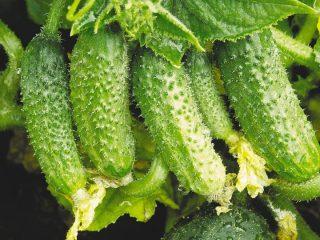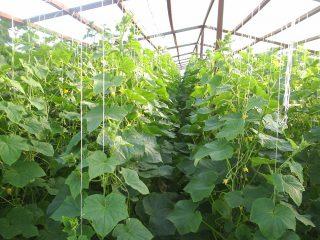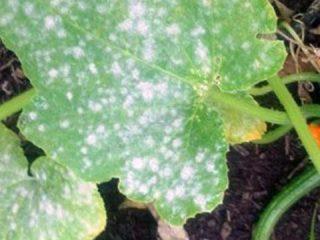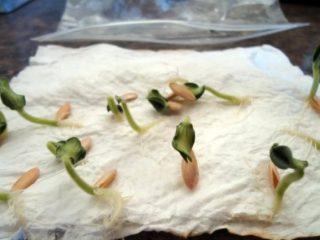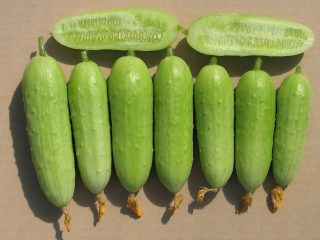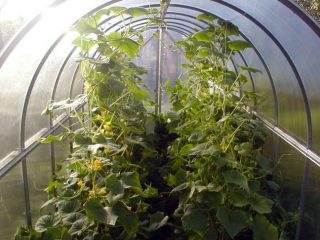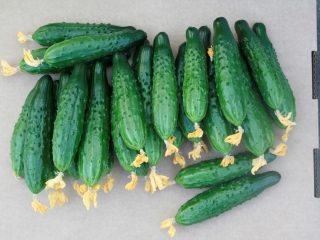Content
- 1 History of origin
- 2 Description of Dolomite F1 cucumbers
- 3 Characteristics of Dolomite cucumbers
- 4 Advantages and disadvantages
- 5 Planting cucumbers Dolomite
- 6 Caring for Dolomite cucumbers
- 7 How to get a big harvest from Dolomite cucumbers
- 8 Conclusion
- 9 Reviews from gardeners about Dolomite F1 cucumbers
Cucumber Dolomite is an early-ripening, high-yielding hybrid. Gherkin-type fruits, excellent for pickling and pickling. They ripen in 5–6 weeks, so they can even be grown by direct sowing in the ground. The agricultural technology is simple, but it is worth considering that the crop needs increased watering.
History of origin
Dolomite cucumber is a first generation hybrid (F1), obtained on the basis of the Dutch agricultural company Nenhems B.V. The author of the variety is Andreas Gertz. Recommended for growing indoors (greenhouses, greenhouses), as well as in open beds. Not included in the Russian register of selection achievements. At the same time, the hybrid has spread to almost all regions.
Description of Dolomite F1 cucumbers
The cucumber bush of the Dolomite variety is open, moderately branched, and of medium vigor. The leaves are rich green in color and medium in size. The bushes are indeterminate - they grow without restrictions throughout the season.
Dolomite cucumbers have a regular cylindrical shape, a surface with small tubercles, and slightly ribbed. The average weight of greens is from 80 to 100 g. The harvest is harvested in the form of mini gherkins - pickles (3-5 cm long) and classic gherkins (5-8, often up to 10-12 cm). The skin is thin. There are white stripes along the surface up to half of the fruit. The spines are light and have a layer of pubescence.
The pulp of Dolomite cucumbers is not bitter, crisp, and has a pleasant sweetness. The fruits are juicy, used fresh, and are excellent for canning in the form of pickles and pickling.
Characteristics of Dolomite cucumbers
Like many other hybrids, Dolomite cucumbers are characterized by good resistance to adverse weather conditions, many diseases and pests. The variety quickly recovers from drought, even if watering is irregular, and rarely suffers from infections. Flowering type: female. The hybrid does not require pollination, so it can be grown in closed greenhouses.
Productivity of cucumbers Dolomite
Cucumbers of the Dolomite variety are quite productive - at the usual planting density of 1 m2 get 5–6 kg of fruit. Accordingly, from each hundred square meters you can collect 500–600 kg. The fruits are transportable - after harvesting, they can be transported to the place of sale or processing.
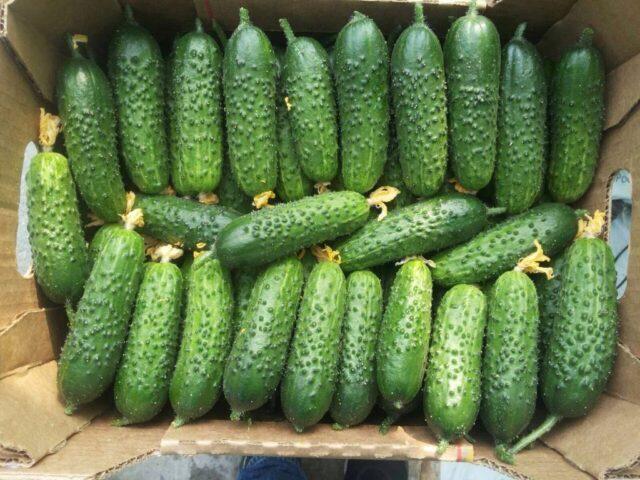
The yield of Dolomite cucumbers reaches 6 kg per square meter
Ripening and flowering dates
Dolomite cucumbers are early hybrids - 38–40 days pass from the moment of germination to the state of technical ripeness. Therefore, the variety can be grown not only by seedlings, but also by direct sowing in the ground.Flowering occurs at the end of May - the first half of June.
Resistance to diseases and pests
Hybrid Dolomite has good resistance to major diseases:
- cucumber mosaic virus;
- olive spot;
- powdery mildew.
With proper care, the crop is rarely affected by insects. If watering is excessive, the greens may rot (especially if the greenhouses are rarely ventilated). Therefore, you need to monitor the volume of water and periodically inspect the plantings. If aphids, spider mites and other pests are found, treat with infusion of wood ash, tobacco dust, garlic cloves, mustard powder and other folk remedies.
If there are too many insects, you need to spray a solution of any of the products once: “Inta-Vir”, “Match”, “Biotlin”, “Aktara”, “Confidor”, “Vertimek”.
Advantages and disadvantages
The Dolomite variety is valued by summer residents for its very good taste and pleasant pulp consistency. This is one of the rare varieties of cucumbers that has a pleasant sweet note. Caring for the crop is simple, which is especially important for beginning gardeners.
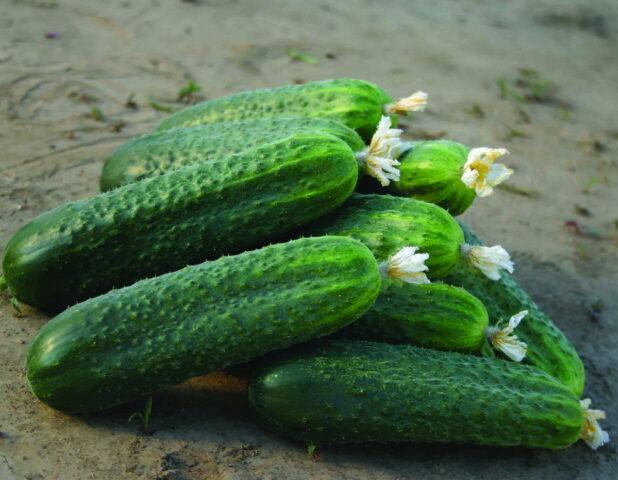
The undoubted advantage of the Dolomite hybrid is the pleasant taste and presentation of cucumbers.
Pros:
- stable and high productivity;
- early ripeness (only 1.5 months);
- drought resistance;
- transportability;
- simple agricultural technology;
- pollinators are not required;
- excellent option for salting and marinating;
- immunity to many diseases.
Minuses:
- you have to constantly buy seeds because it is a hybrid.
Planting cucumbers Dolomite
Since Dolomite cucumbers are early-ripening varieties, they can be grown by direct sowing in the ground even in regions with short summers.If you plan to get an early harvest, planting seedlings is also allowed.
Seedling method
Seeds are sown 21–25 days before transplanting into open ground. The timing depends on climatic conditions.
Region | Sowing seeds for seedlings | Transplantation into the ground |
Middle lane | Second ten days of April | Mid May |
South | Early April | Last days of April |
Ural, North-West | End of April | Third ten days of May |
Siberia, Far East | First half of May | June 1-10 |
Dolomite cucumber seedlings are grown in the traditional way. Soil can be purchased at the store or use a soil mixture of garden soil with humus, sand and peat (2:1:1:1). You can add a few pinches of wood ash as a natural fertilizer. A few weeks before planting, the soil is placed in the freezer or sterilized in the oven for 15–20 minutes (temperature 150 degrees).
Since Dolomite cucumber seedlings do not tolerate diving (transplanting), it is better to immediately plant the seeds in individual containers - optimally in peat pots. Germination is very high (more than 90%), so you can plant one grain at a time.
Standard growing instructions:
- Four hours before planting, place the seeds in a weak solution of a growth stimulator, for example, Epin, Kornevin.
- Plant the seeds to a depth of 1–1.5 cm.
- Sprinkle with soil and moisten with a spray bottle.
- Cover with glass or film with small holes.
- Place in a warm place (25–27 degrees).
- After the shoots emerge, remove the film and lower the temperature slightly.
- A week before transplanting, harden off Dolomite cucumber seedlings. To do this, they are periodically taken outside or onto the balcony.
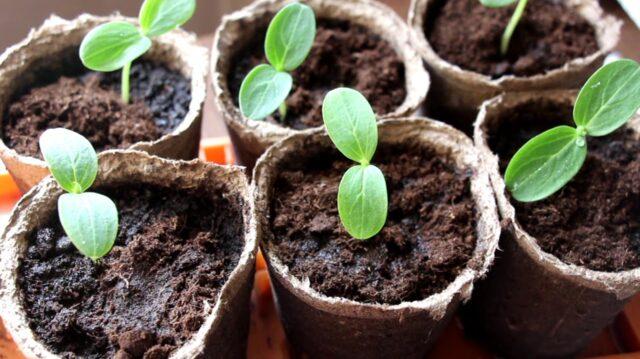
The best way to grow seedlings is in peat pots
Sowing in open ground
The timing of planting seeds in open ground in most cases occurs in the second half of May. At this moment, the soil should warm up to at least 12 degrees, which can be easily checked by burying a thermometer in the ground for 10 minutes. Dolomite cucumber seeds are prepared in the same way, and sowing is carried out in grooves 2 cm deep.
The distance between rows should be 50 cm, and between adjacent plants - 40 cm. Per 1 m2 3–4 seedlings are placed freely. At first, it is better to cover with film and water regularly. This is especially important if the forecast calls for cool days in May.
If the soil is heavy, 1 kg of sawdust or sand is embedded into it for the same area.
Caring for Dolomite cucumbers
Agricultural technology for growing Dolomite cucumbers is standard. Summer residents advise watering seedlings regularly, especially during the first week. Water is given at least twice a week, three times in hot weather, making sure that the soil does not erode due to excess moisture.
After watering, it is necessary to loosen the soil to a depth of 4 cm. At the same time, weeding is carried out, since weeds reduce the yield. To prevent their occurrence, you can mulch the plantings with straw, sawdust and other natural materials.
Feeding is applied regularly - up to six times per season with an interval of 10 days. You can use organic matter and complex mineral supplements. If there is no litter or mullein, analogues are used: “Ideal”, “Fertility” and other compositions.
How to get a big harvest from Dolomite cucumbers
The largest harvest of Dolomite cucumbers can be obtained when grown in a greenhouse. Along with this, you can use other techniques:
- It is better to water cucumbers regularly. The water is taken not cold, but pre-settled.
- To prevent waterlogging, you should not only observe the watering rate, but also ventilate the greenhouse, especially in the heat.
- Fertilizing is applied once every 10 days. At the same time, you cannot use too much nitrogen - otherwise the Dolomite cucumber bush will turn green. It is better to use complex, balanced formulations.
- When growing, you need to pinch the main stem, stimulating the growth of side shoots.
- As soon as the whip grows to 40–50 cm, a garter is made.
- It is also recommended to periodically harvest Dolomite cucumbers, preventing the fruits from overgrowing.
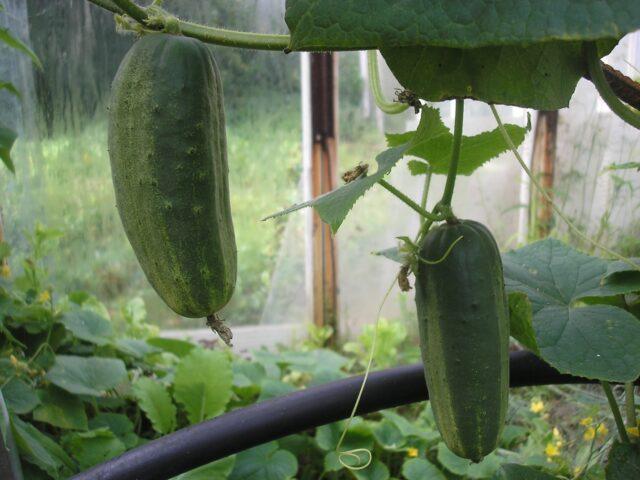
By growing cucumbers in a greenhouse, you can achieve high yields
Conclusion
Dolomite cucumber is one of the best hybrids. It is easy to grow, produces a stable harvest and practically does not suffer from diseases. The variety does not require pollinators. Maintenance is quite simple - both experienced summer residents and novice amateurs can handle it.
Reviews from gardeners about Dolomite F1 cucumbers
